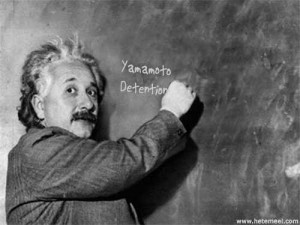Today I learned of the death of a former mentor of mine, Richard (Dick) Yamamoto [1]. I thought I would share some memories of Dick, memories which to this day still shape my own behavior as a physicist. What I have often found intriguing about my own life is that it is the short moments, the little things, that stick.
When I was first invited to join the MIT BaBar group, I was a fresh Ph.D. from the University of Wisconsin-Madison. While the person recruiting me for the position was a young faculty member at MIT, her group leader was Dick. Before I could get the job, I had to have a sit down with Dick so he could meet me and size me up.
I met him in the MIT office at SLAC. We spent the next 45 minutes just chatting. I didn’t know what to expect before I went in, and so naturally I was intimidated. Would I say something dumb? Would I come off as an idiot? The “imposter syndrome” was well at work in my head by the start of that meeting. By the end of the meeting, I was more relaxed and came away with the sense that Dick was a person deeply in tune with the technology that would enable science. Much of the conversation was spent discussing novel and non-existent particle detector technologies, a subject about which I am least comfortable but most interested.
 My second memory of Dick was when he showed up at SLAC for his regular visits. He would collect us for lunch and inevitably we’d go for Japanese food. On one of the trips, he brought along a photo his then girlfriend had printed off the web. The site let you put anything you wanted in a picture of Einstein writing on a blackboard. His girlfriend had written “Detention Yamamoto” in the picture. Until recently, that picture still sat on the door name-plate outside the old BaBar MIT office where I used to work.
My second memory of Dick was when he showed up at SLAC for his regular visits. He would collect us for lunch and inevitably we’d go for Japanese food. On one of the trips, he brought along a photo his then girlfriend had printed off the web. The site let you put anything you wanted in a picture of Einstein writing on a blackboard. His girlfriend had written “Detention Yamamoto” in the picture. Until recently, that picture still sat on the door name-plate outside the old BaBar MIT office where I used to work.
My final memory of Dick is the one that struck me most deeply. I had become interested in doing searches for new physics, specifically dark matter, using invisible decays of mesons. I gave a talk at a BaBar physics meeting that was meant to motivate this topic and suggest means by which BaBar could do this work. I was nervous. I wasn’t sure there was any support for these ideas, when there was “more important” physics to do. I felt like I was out on a limb, just me and a few other people really interested in the topic.
After my talk, Dick came up to me at the front of the room. He was excited. “That was great,” he said, “one of the best things I’ve seen in a while. We need more of this kind of stuff.”
Dick’s comment, whether he realized it or not at the time, was the antithesis of a comment made to me when I was an undergraduate. I was asking a professor if he would write a letter on my behalf for graduate school. He agreed, but said, “I don’t think you should be a particle physicist. I think you’ll be happier doing something else.”
We’ll see. Thankfully, while it took almost a decade, Dick took the sting off that old memory by creating a new and encouraging one. Thanks, Dick.




3 thoughts on “Memories of Yamamoto”
My undergrad advisor, Austin Napier at Tufts, was Yamamoto’s PhD student in the late 70’s. I never met Dick though. One thing you said — tangentially — resonated with me though. In a weird way I’m heartened to hear you’re familiar with that “imposter” feeling. I thought it would go away when I became a postdoc, but no such luck yet. 🙂 Maybe once we get some data…
The sense of being an imposter in this field may never go away. To this day, I live with the feeling that any minute they will come and take away my Ph.D. The trick is to never let that feeling stop you from taking risks. Perhaps, more correctly, one should let that drive risk-taking; after all, the worst they can do is take away the Ph.D.
I had heard that he entered hospice care a short time ago (and the most recent MIT physics magazine officially announced his retirement) but I had not yet heard that he passed. Thank you for sharing these memories of Dick – I’m glad I got to know him through Babar.